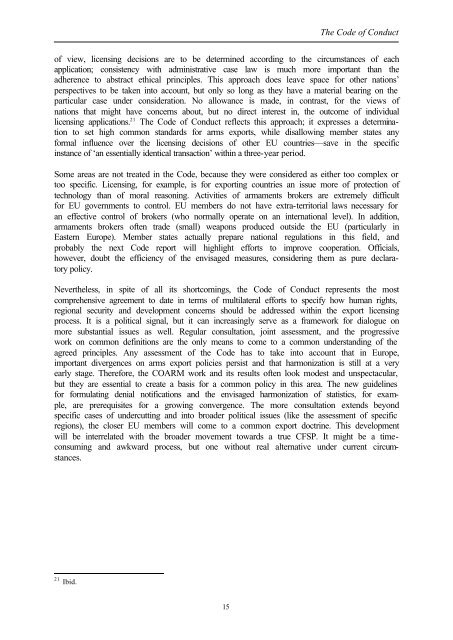A common European export policy for defence and dual-use items?
A common European export policy for defence and dual-use items?
A common European export policy for defence and dual-use items?
You also want an ePaper? Increase the reach of your titles
YUMPU automatically turns print PDFs into web optimized ePapers that Google loves.
The Code of Conduct<br />
of view, licensing decisions are to be determined according to the circumstances of each<br />
application; consistency with administrative case law is much more important than the<br />
adherence to abstract ethical principles. This approach does leave space <strong>for</strong> other nations’<br />
perspectives to be taken into account, but only so long as they have a material bearing on the<br />
particular case under consideration. No allowance is made, in contrast, <strong>for</strong> the views of<br />
nations that might have concerns about, but no direct interest in, the outcome of indivi<strong>dual</strong><br />
licensing applications. 21 The Code of Conduct reflects this approach; it expresses a determination<br />
to set high <strong>common</strong> st<strong>and</strong>ards <strong>for</strong> arms <strong>export</strong>s, while disallowing member states any<br />
<strong>for</strong>mal influence over the licensing decisions of other EU countries—save in the specific<br />
instance of ‘an essentially identical transaction’ within a three-year period.<br />
Some areas are not treated in the Code, beca<strong>use</strong> they were considered as either too complex or<br />
too specific. Licensing, <strong>for</strong> example, is <strong>for</strong> <strong>export</strong>ing countries an issue more of protection of<br />
technology than of moral reasoning. Activities of armaments brokers are extremely difficult<br />
<strong>for</strong> EU governments to control. EU members do not have extra-territorial laws necessary <strong>for</strong><br />
an effective control of brokers (who normally operate on an international level). In addition,<br />
armaments brokers often trade (small) weapons produced outside the EU (particularly in<br />
Eastern Europe). Member states actually prepare national regulations in this field, <strong>and</strong><br />
probably the next Code report will highlight ef<strong>for</strong>ts to improve cooperation. Officials,<br />
however, doubt the efficiency of the envisaged measures, considering them as pure declaratory<br />
<strong>policy</strong>.<br />
Nevertheless, in spite of all its shortcomings, the Code of Conduct represents the most<br />
comprehensive agreement to date in terms of multilateral ef<strong>for</strong>ts to specify how human rights,<br />
regional security <strong>and</strong> development concerns should be addressed within the <strong>export</strong> licensing<br />
process. It is a political signal, but it can increasingly serve as a framework <strong>for</strong> dialogue on<br />
more substantial issues as well. Regular consultation, joint assessment, <strong>and</strong> the progressive<br />
work on <strong>common</strong> definitions are the only means to come to a <strong>common</strong> underst<strong>and</strong>ing of the<br />
agreed principles. Any assessment of the Code has to take into account that in Europe,<br />
important divergences on arms <strong>export</strong> policies persist <strong>and</strong> that harmonization is still at a very<br />
early stage. There<strong>for</strong>e, the COARM work <strong>and</strong> its results often look modest <strong>and</strong> unspectacular,<br />
but they are essential to create a basis <strong>for</strong> a <strong>common</strong> <strong>policy</strong> in this area. The new guidelines<br />
<strong>for</strong> <strong>for</strong>mulating denial notifications <strong>and</strong> the envisaged harmonization of statistics, <strong>for</strong> example,<br />
are prerequisites <strong>for</strong> a growing convergence. The more consultation extends beyond<br />
specific cases of undercutting <strong>and</strong> into broader political issues (like the assessment of specific<br />
regions), the closer EU members will come to a <strong>common</strong> <strong>export</strong> doctrine. This development<br />
will be interrelated with the broader movement towards a true CFSP. It might be a timeconsuming<br />
<strong>and</strong> awkward process, but one without real alternative under current circumstances.<br />
21 Ibid.<br />
15
















